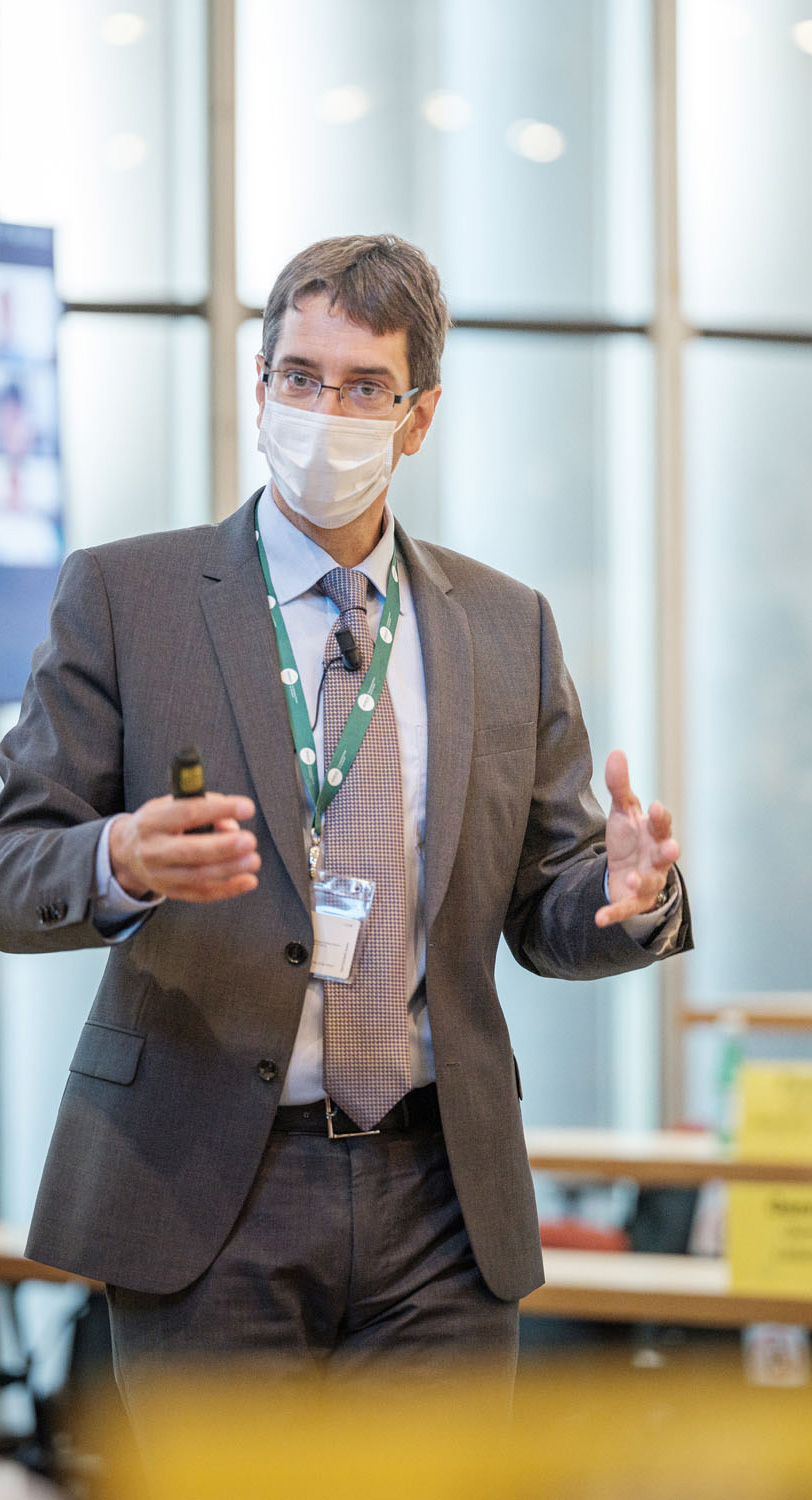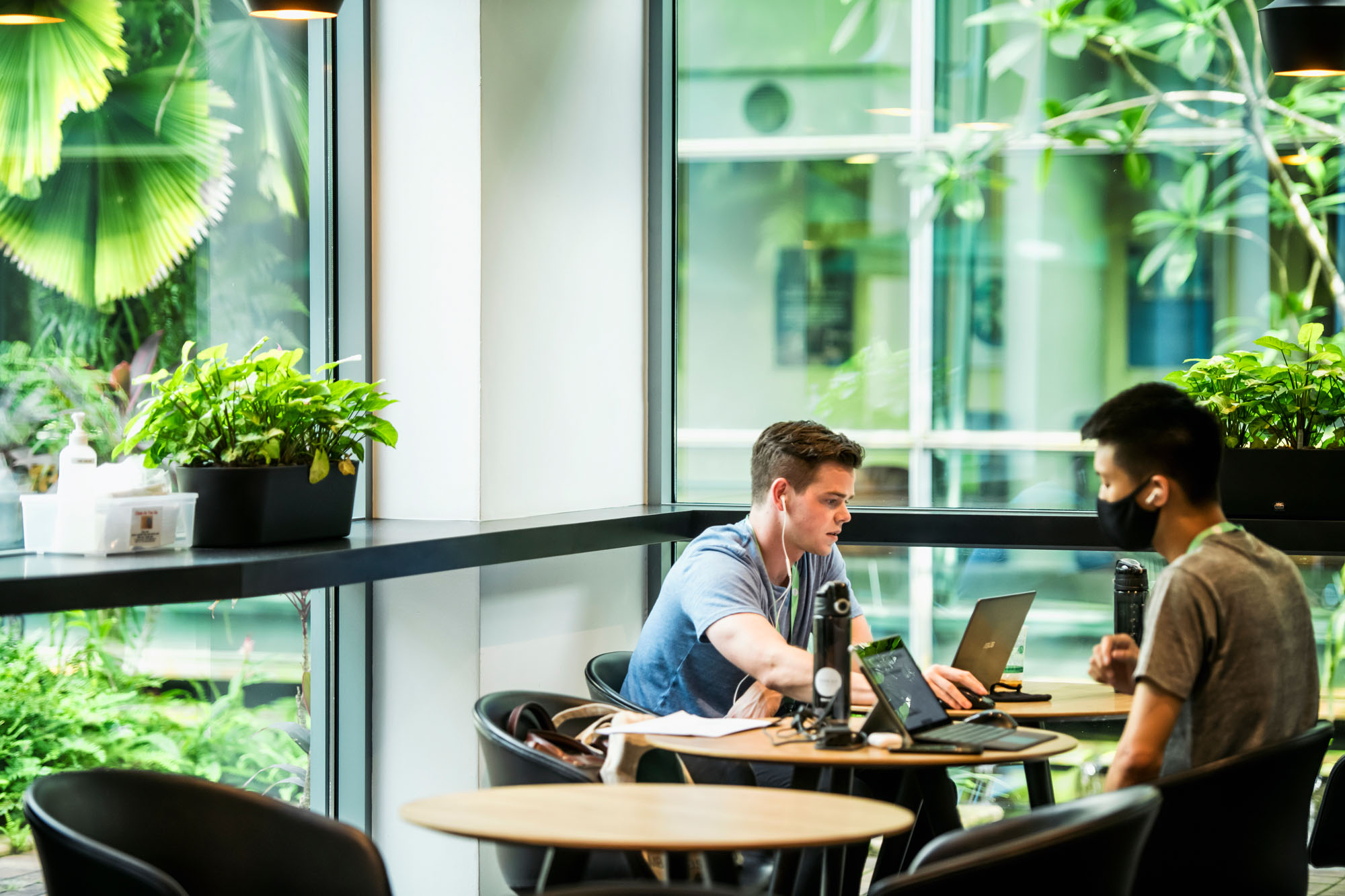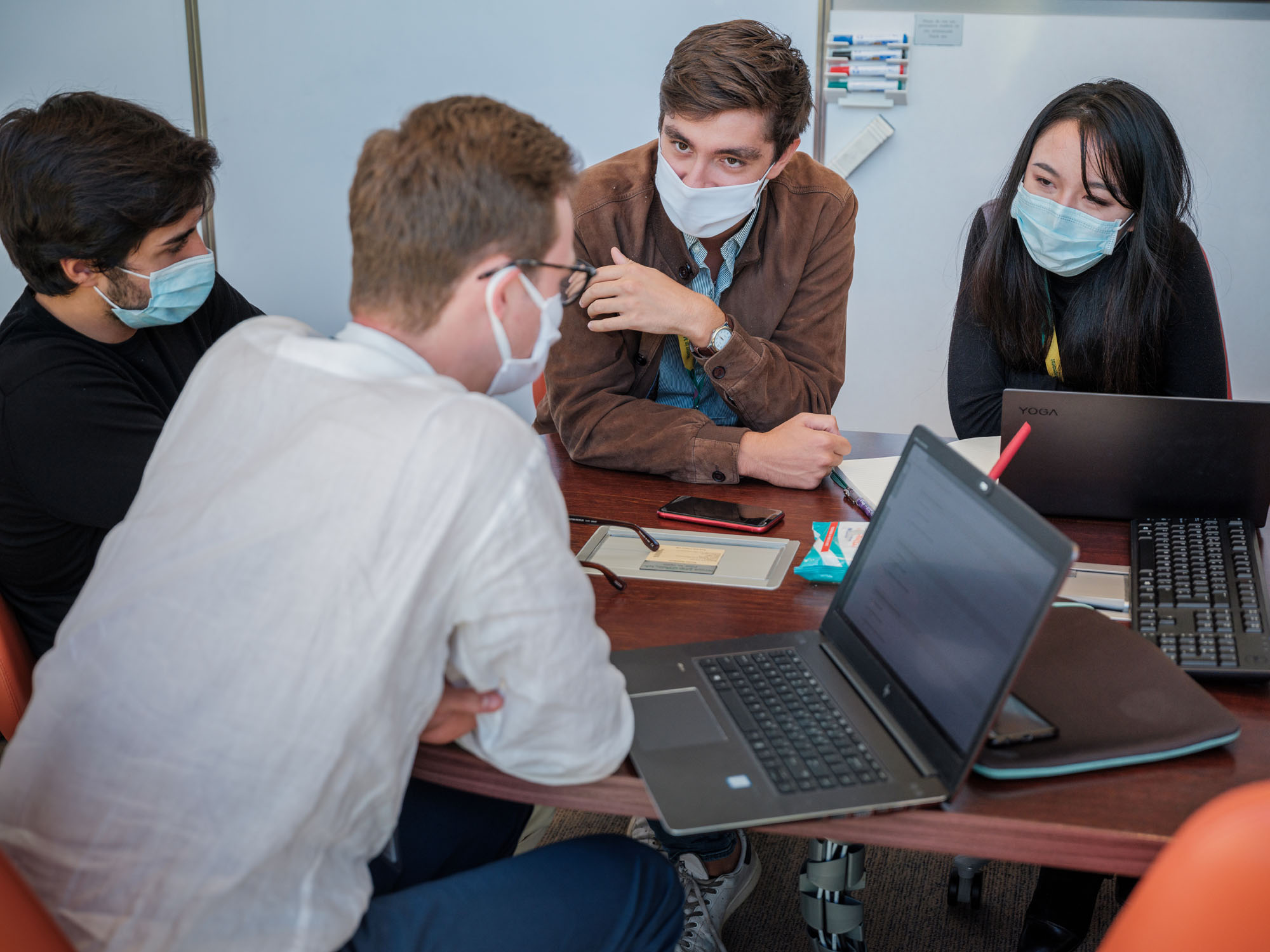05
Degree Programmes - 2020
Sub Title
Discover a learning journey as diverse as our student body
The MBA’20J and EMFin’21s were soon up to speed, while the rolling programme of Executive MBA intakes continued across our campuses. Three “waves” of the Executive Master in Change (EMC) were already successfully underway and the MBA’19Ds had graduation in their sights. The usual December ceremony was soon followed by Executive Master equivalents and the arrival of the MBA’20Ds. And, as we made our first offers of places, we began to realise just how exceptional our pioneer Master in Management (MIM) class would prove to be.
Yet in early 2020, when COVID-19 became a talking point in our corridors and classrooms, we had no idea how extraordinary our current classes would prove themselves to be.
By April 2020, the global pandemic had forced the closure of all our campuses. Within the space of two weeks we had moved all degree courses online, made numerous curriculum innovations and mobilised our entire community to enrich the lockdown learning experience. Our range of Career Development and Psychological Services offerings, including the increasingly popular mindfulness sessions, also continued – albeit virtually. Meanwhile, application pipelines remained strong.
While we could not bring people together physically, we committed to doing so virtually – and our degree programme community of teachers and facilitators embraced the opportunity to adapt our offerings to deliver online instruction to our learners, who adapted with equal aplomb. The innovations of recent years, such as the online “P0” for incoming MBA students, the new Learning Management System, timely experiments with Zoom and the reorganisation of administrative staff into cross-campus function- based teams smoothed the transition to entirely virtual global delivery. We look back with pride on the determination, adaptability and leadership shown by all during this time.
The rapid-prototyping innovations of 2019/2020 are too many to mention. Perhaps most important, was the opportunity for all MBA’20J students to return for a summer “P6” or Summer Electives. Those unable to benefit were awarded an Executive Education voucher for use in the next five years. There is also prolonged access to online learning, additional career support and earlier reunion for classes whose INSEAD experience was disrupted. An innovation from the MBA Class of ’20J themselves was the Business Projects Platform, to showcase INSEAD talent and offer support to real-life companies and problems.

The MBA’20Ds showed similar entrepreneurial flair with the student-led COVID-19 Innovation Competition, in which virtual teams competed to “turn a force majeure into a force for good”. Our congratulations go to the winners: Farm Fresh, which seeks to improve food supply chains in Ghana, and All About Space, which provides a novel “membership” model for companies whose employees might need a short-term, remote desk to work from anywhere in the world. The two teams include not only members of the organising MBA’20D class but also an accepted student from MBA’21J and a member of our partner institution ArtCenter College of Design in Pasadena, California.
By 2 July 2020, we had held our first fully virtual graduation ceremony ever – for the MBA’20J class, almost all of whom had opted not to defer their studies. All other degree programmes were continuing on schedule. Meanwhile, we were busy re-engineering the curriculum and campus experience for the upcoming intakes. While the pandemic experience only served to underline the power of our face- to-face teaching model, we had learned a great deal.
As the new academic year began, we were the only leading international business school fully open for in-person instruction – with, of course, smaller and carefully spaced classes. However, we were ready for all eventualities, thanks to the new “dual-mode” of teaching pioneered in 2019/2020. It seems unlikely that we will ever return to “business school as usual”, at least as we used to know it.
Our September 2019 MBA intake was the largest ever and also had one of the highest GMAT averages ever – all the more impressive, given the maturity of the MBA market. The new improved campus exchange process was somewhat overtaken by events. Indeed, it took on an unexpected form as new virtual teaching formats enabled students to attend classes on any campus, regardless of their own location.
Creativity was at an all-time high among the MBA community this year. Two music videos (“Lockdown” and “We Are the World”, both available on YouTube) by the INSEAD Music Club and MBA’20Js are not only achievements in themselves, but also symbolise a community forced apart yet coming together in a spirit of harmony.
Another creative triumph had come just before lockdown, when an INSEAD MBA’20J team flew into Barcelona on the red-eye from Abu Dhabi for the 25th Roland Berger IESE Case Competition. Sagnik Mukherjee, Subir Roychoudhury Shalom and Akinboboye Elie Bechara faced teams from the world’s top business schools and emerged – after 72 gruelling hours – the 2020 winners.
In September 2019, we had also welcomed our largest ever Global Executive MBA (GEMBA) intake on the Europe campus, again with no compromise in quality. They and their classmates in Asia and Abu Dhabi will graduate in January 2022, the first cohort to do so. Their colleagues on the Tsinghua–INSEAD EMBA (TIEMBA) programme now graduate in July. In 2020, both programmes were ranked in the global top ten by the Financial Times with the TIEMBA at a very impressive #5. Feedback from all EMBA students for the new dual mode of teaching is very good.
Last but far from least, the new Master in Management (MIM) was accredited by the French Government in 2019/2020, following the addition of an internship component. After the long years of thorough market research and programme design, INSEAD was ready for the inaugural intake of September 2020. As we welcomed the exceptional new class – the youngest ever at INSEAD – we paused to look back on the often arduous journey of 2019/2020. In our rear view mirror, we saw a year of challenges but also a year of triumph over adversity and immense creativity. Our portfolio of Master Degree Programmes was embarking on a new academic year larger, stronger and more diverse than ever before – making us well placed to face the uncertainties on the road ahead.
The PhD programme, which is largely funded by INSEAD itself, represents our contribution to the next generation of global business academia. The new graduates have already joined prestigious institutions such as London Business School, the Rotman School of Management at the University of Toronto, the Indian School of Business and the National University of Singapore, to name a few.
We are particularly proud that our recent classes include so many outstanding female researchers, which means that INSEAD will be playing an increasingly important part in promoting gender parity among business faculty. In fact, around half of our PhD population and 60% of the 15 new entrants of September 2020 are women.

Our PhD graduates are encouraged to take what they have learned from INSEAD to the global academic community as they hone and cultivate their research and knowledge in their fields of expertise. Even though many carry on to excel in their academic careers outside of INSEAD, they continue to bring prestige to the school through their research and collaborations with their peers, INSEAD professors who were their former mentors, and even current INSEAD PhD students. In the summer of 2020, we were delighted to hear that Anne-Claire Pache PhD’10, already a Chaired Professor at ESSEC Business School, had received the prestigious Academy of Management Review “Decade Award”.
Among the many achievements of our PhD students were two top prizes at academic conferences last year: Dinara Akchurina (Marketing) for her dissertation proposal (INFORMS Society for Marketing Science 2019) and Kian Siong Tey (Organisational Behaviour) for a paper co-written with his INSEAD advisor and PhD peers (Academy of Management 2020).
Our PhD students have proven to be resilient throughout the pandemic. Those in the two-year coursework phase of the programme are used to studying remotely, as many classes are taught in parallel across campuses, and those already at the dissertation stage continued working more or less as normal but from home.
Alongside his academic work, Vivek Choudhary (Technology and Operations Management) provided support (by deploying a web platform and smartphone app) to the district administration in the Mokokchung District of India, as they mobilised to make face masks and personal protective equipment for the local population and manage quarantined people and facilities.
Some students have even been able to turn the COVID-19 crisis to their advantage by embarking on topical research or reorienting existing projects.
Xina Li (Strategy) is working on food security during the pandemic with particular reference to migrant populations, while Maria Langlois (Marketing) is studying the psychosocial factors that led Americans of low socioeconomic status to gain weight during the pandemic – thus exposing a population already at risk from the virus to even greater danger. Similarly, Ekin Ilseven (Strategy) is generating insights on organisational resilience that he is also applying to the resilience of urban communities in his native Turkey.
Several other students are researching the interactions between business and society more generally. Here are just a few examples:
• Nicolo Bertani (Decision Sciences) is researching how to reduce urban crime through interventions on urban geography.
• May-Anne Very (Strategy) is exploring how firms can use corporate strategy like mergers and acquisitions to develop corporate social responsibility, with a particular focus on the food and beverage industry.
• Geoffrey Tomaino (Marketing) is investigating how companies can be more transparent about the commercially sensitive or highly complex algorithms they use to make decisions affecting customers.
• Anna Szerb (Strategy) is studying how “hybrid” organisations that combine social and commercial goals, such as social enterprises, can scale up more effectively.
• Ratnalekha Viswanadham (Marketing) is analysing interventions that instil selfcontrol in people, particularly for applications in health, in a joint project that is part of INSEAD’s partnership with Sorbonne University.
It was business as usual for the Career Development Centre and the MBA classes of ’19D and ’20J in the final months of 2019. In France, INSEAD joined forces with Institut Polytechnique and France Digital to run the annual Scale-up Fair in Paris for the first time. In Singapore, the September Networking Event – similarly devoted to start-ups and scale-ups – attracted a large number of students. Panellists from companies, big and small, contributed to a fascinating discussion on sustainable food production titled “Feeding the Future”.
The first half of the year also produced a typically good crop of career treks, focusing on: venture capital, fintech, industry and luxury brands in Asia; fintech, financial services, innovation/design and start-ups in Europe; and companies from all sectors in Amsterdam and Dubai. From Berlin to Ho Chi Minh City, our students found a warm welcome and much learning.
The MBA’19Ds went on to complete a traditional recruitment experience and emerged into a normal business world. Their career outcomes were impressive, matching those of the previous year’s graduating classes. Consulting again dominated the top employers’ list, with technology companies also rising up the ranks.

During the crisis, the Career Development Centre moved all curriculum and recruiting activities online, thanks to the agility of the Operations team and strong relationships with digital experts.
At the same time, its specialist staff remained in close contact with our portfolio of 600+ recruiters across the world and the global INSEAD community. Alumni rallied in support of current students by joining new activities such as panels, webinars and chats. Our specialist team of career coaches and Sector Advisors was also an inspiration – to colleagues as well as students – as they adapted quickly to online delivery, refusing to allow dreams or ambitions to be compromised.
From March 2020 onwards, we hosted 250+ companies online – seamlessly turning the on-campus recruitment programme into a virtual experience and extending the formal recruitment period into P5 for the MBA’20Js. In addition, we provided ongoing support to those graduating mid-pandemic, although many were successful in securing great job offers despite the circumstances.
The highlight of the year was undoubtedly INSEAD’s first ever Virtual Career Fair. It gave us particular pleasure to host the Initiative in partnership with the world-leading recruitment platform MBA-Exchange.com, founded by Bilal Ojjeh MBA’94D. With 66 half-hour webinars, companies from all sectors and regions, 458 job openings promoted in 56 countries and 1,500 enthusiastic participants, including alumni and Executive Master students, the event surpassed even our greatest expectations. Recruiter and student satisfaction both stood at 4.2 out of a maximum of 5, which is an exceptional score.

In line with the previous summer, 76% of students undertook a formal internship, completed a short project or joined a summer start- up tour (SSUP). Some 66% of this group worked for start-ups or SMEs and 64% worked remotely. SSUP accounted for eight teams of three MBAs in Europe and Asia, who explored different sectors (healthcare, fintech, foodtech, tech4good, greentech and venture capital), many of their projects integrating a sustainability angle.
In addition to formal internship opportunities – and with the help of alumni – many MBA students had the opportunity to work on pro bono projects in 2019/2020. In fact, this was just one of several upsides to the pandemic. The other major benefits came from the switch to a virtual recruiting experience, which allowed us to have multiple speakers joining from different geographical markets, including very senior executives. We are planning to incorporate many of these hitherto unseen advantages into our future activities.
Although full-time students still account for the majority of our work, the Career Development Centre serves more and more working professionals every year – from alumni contemplating radical career changes to Executive Master participants seeking promotions. For this client base, we are used to working online and in 2019/2020 our activities grew yet further, several of them merging with our services for MBA students.
Over 20 career education events specifically targeting the working professionals audience were held online. Furthermore, at the Virtual Career Fair, over 80% of recruiters were targeting executive talent.
We also found ourselves offering unexpected support during 2019/2020. We quickly organised an online peer-coaching programme for over 80 executives whose jobs were impacted by COVID-19, and provided additional coaching hours to alumni similarly affected. As always, we worked closely with our colleagues in Alumni Relations. Together, we have successfully launched iLink, a specialist career advising and networking platform for alumni. iLink will be available to current students in March 2021.